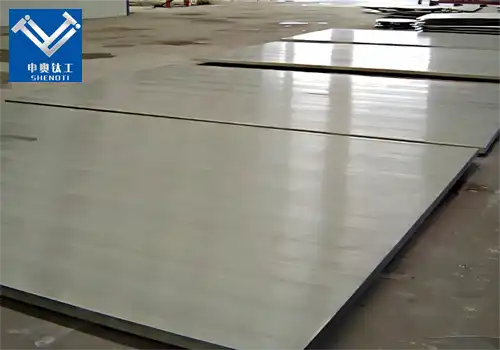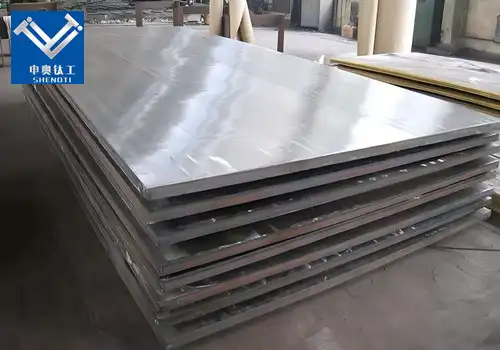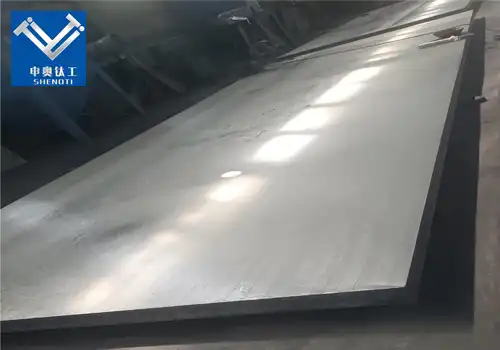
In Which Industries Are Titanium Steel Clad Plates Mainly Used?
2025-05-06 16:44:20
In Which Industries Are Titanium Steel Clad Plates Mainly Used?
Titanium steel clad plates are engineered materials that combine the corrosion resistance of titanium with the strength and cost-effectiveness of carbon or stainless steel. This fusion makes them indispensable across various industries, especially where durability, resistance to extreme environments, and cost-efficiency are paramount.
What Are the Advantages of Titanium Steel Clad Plates?
Titanium steel clad plates offer a unique combination of properties that make them highly valuable in industrial applications:
1. Exceptional Corrosion Resistance
Titanium's natural oxide layer provides outstanding resistance to corrosion, especially in aggressive environments containing acids, alkalis, and chlorides. This makes titanium clad plates ideal for industries like petrochemicals, marine engineering, and desalination, where equipment is exposed to corrosive substances.
2. High Strength-to-Weight Ratio
By bonding titanium with steel, these clad plates achieve high structural strength while maintaining a relatively low weight. This is particularly beneficial in applications where both strength and weight reduction are critical, such as in aerospace and automotive industries.
3. Cost-Effectiveness
Pure titanium is expensive, but by cladding a thin layer of titanium onto a steel substrate, manufacturers can significantly reduce costs without compromising on performance. This makes titanium clad plates a cost-effective solution for many industries requiring corrosion-resistant materials.
4. Thermal Stability
Titanium clad plates can withstand high temperatures, making them suitable for use in heat exchangers, condensers, and other equipment subjected to thermal stress.
5. Biocompatibility
Titanium's compatibility with biological tissues allows for its use in medical applications, including surgical instruments and implants, where both strength and biocompatibility are essential.
How Are Titanium Steel Clad Plates Manufactured?
The manufacturing of titanium steel clad plates involves bonding a layer of titanium to a steel substrate. The primary methods include:
1. Explosion Bonding
This process uses controlled explosive energy to bond titanium and steel plates together. The high-pressure impact creates a metallurgical bond without melting the materials, preserving their individual properties.
2. Hot Rolling
In hot rolling, titanium and steel plates are heated and passed through rollers to bond them together. This method ensures a uniform bond and is suitable for producing large plates.
3. Explosive Roll Bonding
A combination of explosion bonding and rolling, this method enhances the bond's strength and uniformity, making it suitable for applications requiring high reliability.
Each manufacturing method has its advantages, and the choice depends on the specific requirements of the application, such as plate size, thickness, and intended use.
What Is the Cost of Titanium Steel Clad Plates?
The cost of titanium steel clad plates varies based on several factors:
Material Grades: Different grades of titanium and steel have varying costs. Higher-grade materials offer better performance but at a higher price.
Plate Thickness and Size: Thicker and larger plates require more material and processing, increasing the cost.
Manufacturing Method: Processes like explosion bonding may be more expensive due to the specialized equipment and safety measures required.
Market Demand: Fluctuations in the demand for titanium and steel can affect raw material prices, impacting the overall cost.
Despite these variables, titanium clad plates are generally more cost-effective than using solid titanium, offering a balance between performance and affordability.
Primary Industries Utilizing Titanium Steel Clad Plates
1. Petrochemical Industry
Titanium clad plates are extensively used in the petrochemical sector for equipment like distillation columns, reactors, and heat exchangers. Their corrosion resistance ensures longevity and safety when handling aggressive chemicals.
2. Power Generation
In power plants, especially those utilizing flue gas desulfurization systems, titanium clad plates are used in condensers and chimney liners to resist corrosion from acidic gases and high temperatures.
3. Marine Engineering
The marine environment is highly corrosive due to saltwater exposure. Titanium clad plates are used in shipbuilding, offshore platforms, and desalination plants to enhance durability and reduce maintenance costs.
4. Aerospace Industry
The aerospace sector benefits from the high strength-to-weight ratio of titanium clad plates, using them in aircraft components and structures where both strength and weight savings are critical.
5. Automotive Industry
In high-performance and electric vehicles, titanium clad plates are used in exhaust systems and structural components to reduce weight and improve fuel efficiency.
6. Medical Field
Due to their biocompatibility, titanium clad plates are used in surgical instruments and implants, offering strength and resistance to bodily fluids.
7. Architecture and Construction
Titanium clad plates are used in building facades, roofing, and structural components, providing aesthetic appeal and resistance to environmental factors.
8. Food Processing Industry
The non-toxic and corrosion-resistant nature of titanium makes clad plates suitable for food processing equipment, ensuring hygiene and longevity.
Titanium steel clad plates are versatile materials that offer a combination of corrosion resistance, strength, and cost-effectiveness. Their applications span across various industries, including petrochemicals, power generation, marine engineering, aerospace, automotive, medical, construction, and food processing. By understanding their advantages, manufacturing processes, and cost factors, industries can make informed decisions to enhance performance and efficiency.
Contact Us
For more information about our titanium steel clad plates and how they can benefit your industry, please contact us:Email: zh@baojiti.com.cn
Our team is ready to assist you with your specific requirements and provide tailored solutions to meet your needs.














